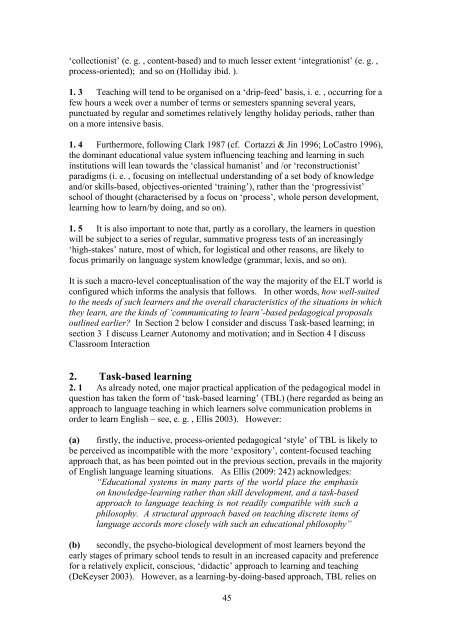RADICAL TEFL
2hqhXJd
2hqhXJd
You also want an ePaper? Increase the reach of your titles
YUMPU automatically turns print PDFs into web optimized ePapers that Google loves.
‘collectionist’ (e. g. , content-based) and to much lesser extent ‘integrationist’ (e. g. ,<br />
process-oriented); and so on (Holliday ibid. ).<br />
1. 3 Teaching will tend to be organised on a ‘drip-feed’ basis, i. e. , occurring for a<br />
few hours a week over a number of terms or semesters spanning several years,<br />
punctuated by regular and sometimes relatively lengthy holiday periods, rather than<br />
on a more intensive basis.<br />
1. 4 Furthermore, following Clark 1987 (cf. Cortazzi & Jin 1996; LoCastro 1996),<br />
the dominant educational value system influencing teaching and learning in such<br />
institutions will lean towards the ‘classical humanist’ and /or ‘reconstructionist’<br />
paradigms (i. e. , focusing on intellectual understanding of a set body of knowledge<br />
and/or skills-based, objectives-oriented ‘training’), rather than the ‘progressivist’<br />
school of thought (characterised by a focus on ‘process’, whole person development,<br />
learning how to learn/by doing, and so on).<br />
1. 5 It is also important to note that, partly as a corollary, the learners in question<br />
will be subject to a series of regular, summative progress tests of an increasingly<br />
‘high-stakes’ nature, most of which, for logistical and other reasons, are likely to<br />
focus primarily on language system knowledge (grammar, lexis, and so on).<br />
It is such a macro-level conceptualisation of the way the majority of the ELT world is<br />
configured which informs the analysis that follows. In other words, how well-suited<br />
to the needs of such learners and the overall characteristics of the situations in which<br />
they learn, are the kinds of ‘communicating to learn’-based pedagogical proposals<br />
outlined earlier? In Section 2 below I consider and discuss Task-based learning; in<br />
section 3 I discuss Learner Autonomy and motivation; and in Section 4 I discuss<br />
Classroom Interaction<br />
2. Task-based learning<br />
2. 1 As already noted, one major practical application of the pedagogical model in<br />
question has taken the form of ‘task-based learning’ (TBL) (here regarded as being an<br />
approach to language teaching in which learners solve communication problems in<br />
order to learn English – see, e. g. , Ellis 2003). However:<br />
(a) firstly, the inductive, process-oriented pedagogical ‘style’ of TBL is likely to<br />
be perceived as incompatible with the more ‘expository’, content-focused teaching<br />
approach that, as has been pointed out in the previous section, prevails in the majority<br />
of English language learning situations. As Ellis (2009: 242) acknowledges:<br />
“Educational systems in many parts of the world place the emphasis<br />
on knowledge-learning rather than skill development, and a task-based<br />
approach to language teaching is not readily compatible with such a<br />
philosophy. A structural approach based on teaching discrete items of<br />
language accords more closely with such an educational philosophy”<br />
(b) secondly, the psycho-biological development of most learners beyond the<br />
early stages of primary school tends to result in an increased capacity and preference<br />
for a relatively explicit, conscious, ‘didactic’ approach to learning and teaching<br />
(DeKeyser 2003). However, as a learning-by-doing-based approach, TBL relies on<br />
45


